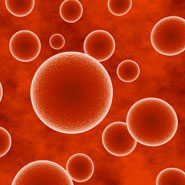Professor Dave Bates and Dr Steve Harper who run the Microvascular Research Laboratories (MVRL) in the University’s Department of Physiology and Pharmacology, discovered the potential therapy for cancer whilst carrying out on-going research into the area funded by the Wellcome Trust, British Heart Foundation, Fight for Sight and Cancer Research UK.
The therapy is based on a novel, naturally occurring form of vascular endothelial growth factor (VEGF) which they have called ‘VEGF165b’. It works by inhibiting the process of angiogenesis (the formation of new blood vessels), which is crucial for the rapid growth of cancerous tumours. Each year in the UK, more than a quarter of a million people are diagnosed with cancer.
The technology will be licensed to PhiloGene Inc, in a multimillion-dollar deal that includes equity and royalties, as well as continued support for the University of Bristol. The technology had been supported in pre-clinical development through a Cancer Research Technology Development Fund award. PhiloGene Inc will now develop the technology taking the therapy through to clinical trials.
Professor Dave Bates, a British Heart Foundation funded fellow at the University of Bristol, said: “Understanding how vascular growth factors (VEGFs) control microvascular function is a key hurdle in developing treatments for diseases such as cancer, blindness and heart disease. We are excited that this deal will bring our findings closer to clinical trial.”
As an anti-angiogenic compound, VEGF165b has potential for eye diseases such as age related macular degeneration and diabetic retinopathy which rely on angiogenesis. Of the estimated 16 million diabetics in the US, approximately 45 per cent have diabetic retinopathy. The chances of developing this increase with time as a diabetic patient. Age related macular degeneration is the most common cause of blindness in the western world, affecting one in ten people over the age of 55.
Dr Steven Harper, Senior Research Fellow in the Department of Physiology and Pharmacology, said: “Taking basic biomedical research from discovery to clinical treatment, from bench to bedside, has been the goal of the MVRL since we set it up in 2001. This deal will enable the first clinical trial to start at the end of 2008.”
David Naveh, Chairman and co-founder of PhiloGene Inc, added: “The University of Bristol has a long standing reputation for research excellence in this field and we are looking forward to taking VEGF165b to the next level. The findings of the Bristol team in animal models, combined with human biomarker data, indicate potential advantages in efficacy and reduced toxicity over the current standard of care (Avastin & Lucentis) and offers a novel approach relative to the competing therapies in development. “
